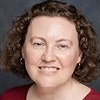2.3: Thomas More
- Page ID
- 7732
(1478-1535)

A martyr, humanist, historian, dramatist, and satirist, Thomas More was grandson to a baker. His father John More (1451-1530) married Agnes Graunger, whose father was a wealthy merchant and Sheriff of London. John More was a successful lawyer, ultimately knighted and serving on the Court of King’s Bench. Thomas More received a gentleman’s education, studying at St. Anthony’s School in London before entering the household of John Morton (1420-1500), who was at that time both Archbishop of Canterbury and Lord Chancellor of England. Thomas More’s learning, humanist scholarship, and writing defined his character, as did his statesmanship. He studied for two years at Oxford before he acceded to his father’s wishes by entering New Inn to study law, being called to the Bar in 1502. His own wishes had a more spiritual bent, for the next year saw him living near a Carthusian monastery, following that order’s discipline, praying, fasting, self-flagellating, and abasing the flesh by wearing a hair shirt. According to his friend, the Humanist Desiderius Erasmus of Rotterdam (1466-1536), More considered joining the Franciscan order.
Instead, he entered Parliament, advocating government efficiency and denouncing heavy taxation. In 1505, he married Jane Colt; they had four children before she died in 1500. An exceptionally short thirty days later, he married Alice Harpur Middleton (1474-1546), a wealthy widow. Her daughter from her first marriage, along with More’s daughters Margaret, Elizabeth, and Cicely received a classical education, with Margaret later gaining renown for her knowledge of Latin. More balanced a contented domestic life with an active public one. A successful barrister, he served as under-sherrif of the City of London, as Master of the Court of Requests, and as a Privy Counsellor. He traveled to Flanders as a delegate for Henry VIII and Cardinal Wolsey (1473-1530)—who recommended him as Speaker of the House of Commons—then became Chancellor of the Duchy of Lancaster.
He gained influence as Henry VIII’s advisor, particularly through his condemnation of the Lutheran heresy (that is, the Reformation). Henry VIII granted More a pension, land, and sinecures. When Wolsey failed to obtain Henry VIII’s annulment from Catherine of Aragon, Wolsey was removed as Lord Chancellor of England and expelled from court. Henry VIII then named More Wolsey’s replacement as Lord Chancellor. In this position, More continued to support the Roman Catholic Church, possibly to the point of approving the torture and burning of Protestants. He certainly suppressed William Tyndale’s English translation of the New Testament (1526), one that turned directly to the Hebrew and Greek, as challenging the power of the Roman Catholic Church in England. Tyndale’s The Obedience of a Christian Man, and how Christian rulers ought to govern (1528) probably helped to encourage Henry VIII to become head of the Church in England, replacing the Pope, and breaking with the Roman Catholic Church. He then divorced Catherine of Aragon to marry Anne Boleyn and had several acts passed to secure the legitimacy of their issue. More resigned as Lord Chancellor and refused to take the Succession Oath. He was imprisoned then beheaded for high treason.
Seemingly far away from these political and religious controversies, More’s Utopia (“No Place” or “Nowhere,” in English) depicts a fictional good place located somewhere in the New World whose citizens practice a form of communism, welfare, and undenominational theism. To the classical model of Plato’s The Republic, More added the contemporary contrast of New World and Old World cultures. In Utopia, some women could be priests, and all priests are chosen for their holiness. All citizens work, for a limited time on farms, and then in various trades, such as carpentry and masonry; they use their leisure time for learning. The ethical basis of their lives satirically critiques the corruption and immorality of More’s society. It’s difficult to attribute any particular Utopian practice to More’s own held beliefs, especially considering their religious tolerance and his actions against Protestants. Their ethical behavior seems superior to England’s. But that may not be More’s main point. His main critique may be wonder at a society that can do so much good—without Christian revelation. And condemnation of the pride that keeps his society from emulating such goodness—despite having that revelation.



